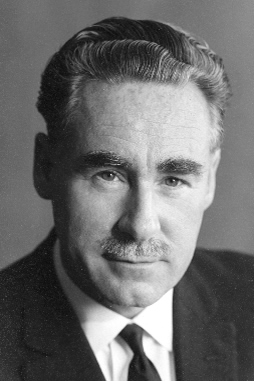Jack Odell (John William Odell)
 7/7/07
7/7/07  7/19/07
7/19/07

photo circa 1968 when Jack received the OBE
John W. "Jack" Odell was born London March 19, 1920, and died from bronchopneumonia and parkinson's disease on July 7, 2007 in Barnet, Hertfordshire. Jack's daughter Liz wrote me that Jack passed away peacefully at the age of 87. Jack was twice married and had 2 daughters, Ann and Elizabeth. Jack is survived by his wife, the former Patricia Hilsdon, two daughters, three stepdaughters and a brother.
Jack was born into a working-class family in East London in 1920. He was expelled from his council school at 13, and at 14 went to work for Simms Motor Units. From then until the outbreak of war he did a variety of jobs: driving a van, doing menial tasks in an estate agent’s, operating a cinema projector. He joined the Royal Army Service Corps and then, when it was formed, the Royal Electrical and Mechanical Engineers (REME). The Army gave him a trade as a mechanic, and in 1943 with 5 years’ service in North Africa and then Italy he achieved sergeant’s rank and found himself in charge of the maintenance and repair of transport and armored fighting vehicles.
On his private's pay of three shillings a day, Odell bought up spares for Primus stoves whenever he found himself in Cairo or Alexandria, and set himself up as a part-time repairman. By the end of the war he had saved up £300, and got married on the proceeds.
Back in civilian life, Jack was employed by Diecast and Machine Tools, a small die-casting firm in north London, learning the business from the bottom up by spending his first day sweeping the floor for 3s 6d an hour. Jack bought some molds and set up on his own at the same time Jack's childhood acquaintance Leslie Smith had joined with Rodney Smith to form Lesney. When the local council refused Jack permission to manufacture in his own residentially zoned premises, Jack sublet from Leslie and Rodney at their Rifleman Pub premises for a period. and then the trio joined forces.
Jack's daughter, Ann, had just started school, and the school only allowed her to take into school a toy that could be contained within a matchbox. When Jack made her a miniature road roller out of brass, and painted red and green, all Ann's school friends wanted one. Jack made a mold and cast a few, and the "Matchbox" miniature 1-75 range was born.
Jack was a "damn good engineer" and a recognized die cast expert. It was Jack’s task to monitor developments in the car industry, updating the models frequently and making sure that details on dashboards, bonnets and wheels were correct. Jack designed the special machinery that pressure-sprayed tiny silver headlamps on the models, and other equipment that produced molded plastic interiors for the cars and lorries. Some cars had more than 100 die-cast parts, including windshield wipers and ceiling hooks.
Lesney started doing well in the early 1950s, and by 1966 was selling 100 million toys annually. By 1960, when it went public, Jack had realized his ambition to become a millionaire by the age of 40. “I made it with a few days to spare,” he liked to recall. Jack went on to amass a personal fortune of £35 million by his 50th birthday.
Jack was awarded the OBE in 1968.
In 1973 Jack Odell resigned as directory, though remaining as deputy chairman, leaving Leslie Smith as the sole director.
By 1980 Lesney was feeling financial strain. Jack came out of retirement as joint vice-chairman in 1981 for a year, and David Yeh of Universal Toys struck a deal to manufacture Matchbox toys in his far east factories. Universal Toys bought the company on September 24, 1982. Lesney Products still appeared on toys until as late as 1985.
In 1983 Jack purchased much of the company's tooling and machinery and installed it in a new factory in Ponders End, north London, and formed Lledo ("Odell" spelled backwards, and Jack's radio call sign during the war). Lledo concentrated on limited models in the larger scale called "Days Gone" directed to the collectors' market rather than children. Lledo initially struggled, but succeeded on expanding to promotional items – most often models of vintage and classic vans and buses carrying promotional livery and sold as limited editions. Jack sold Lledo in 1996, and continued as its chairman until 1999 when he finally retired.
Obituaries:
